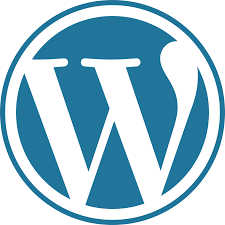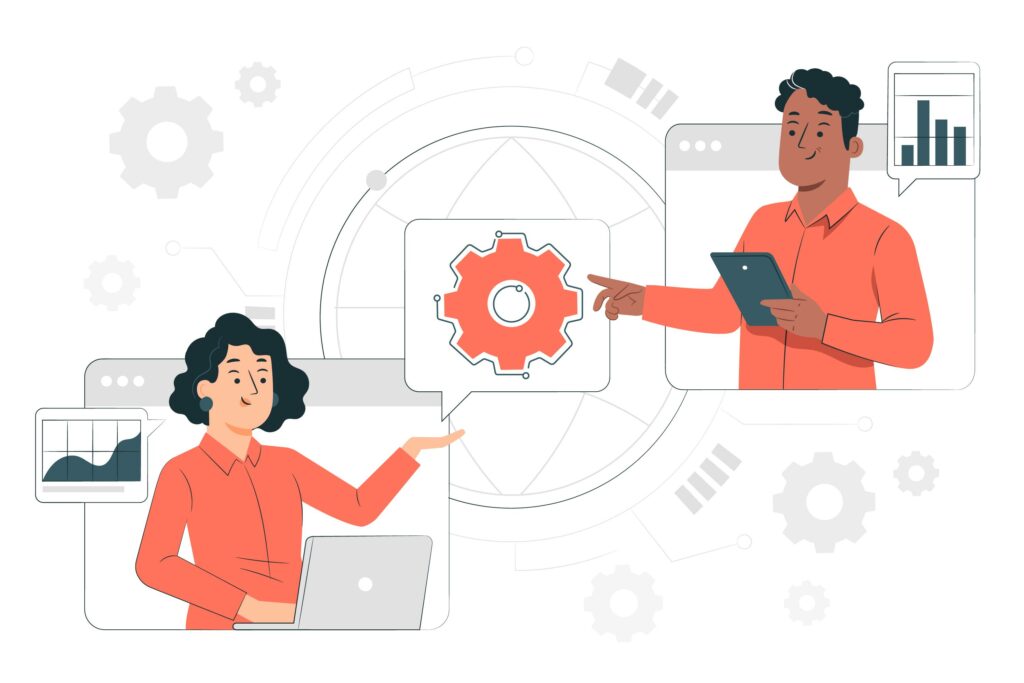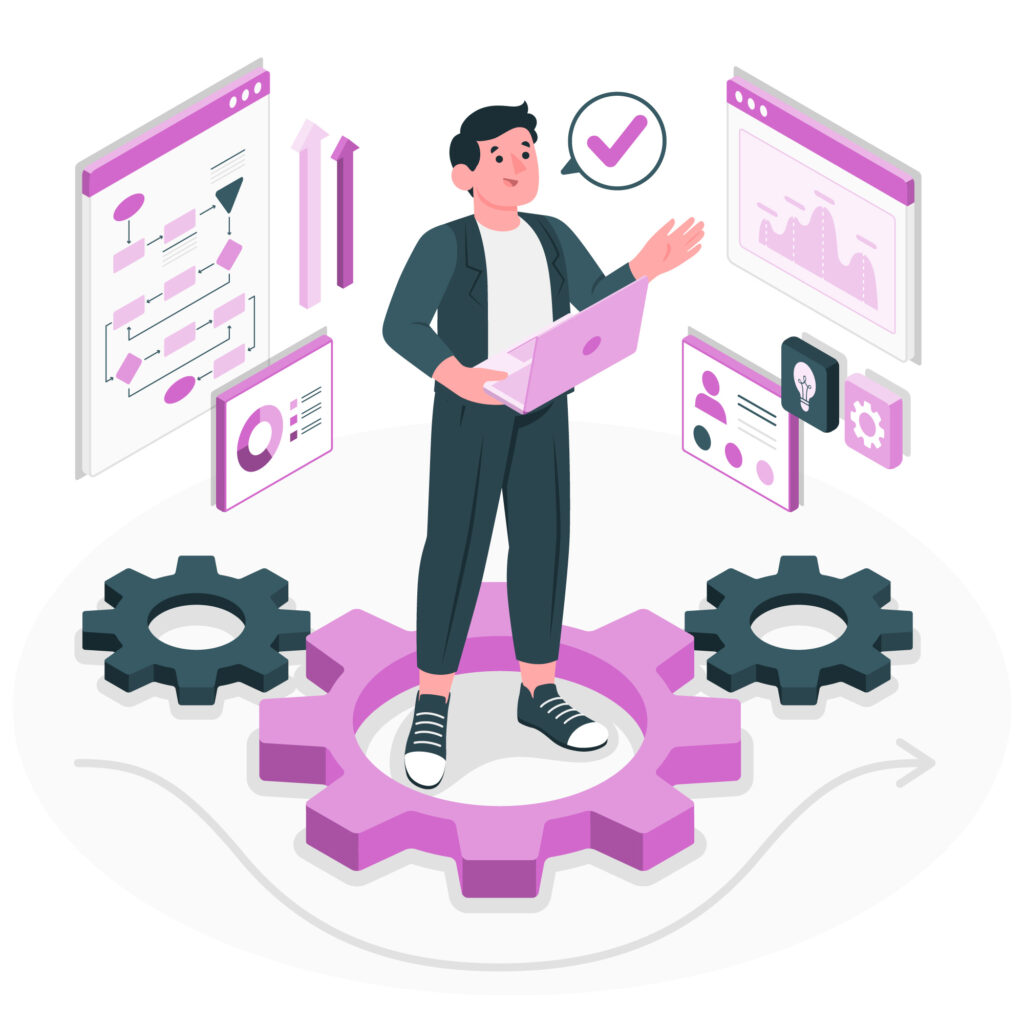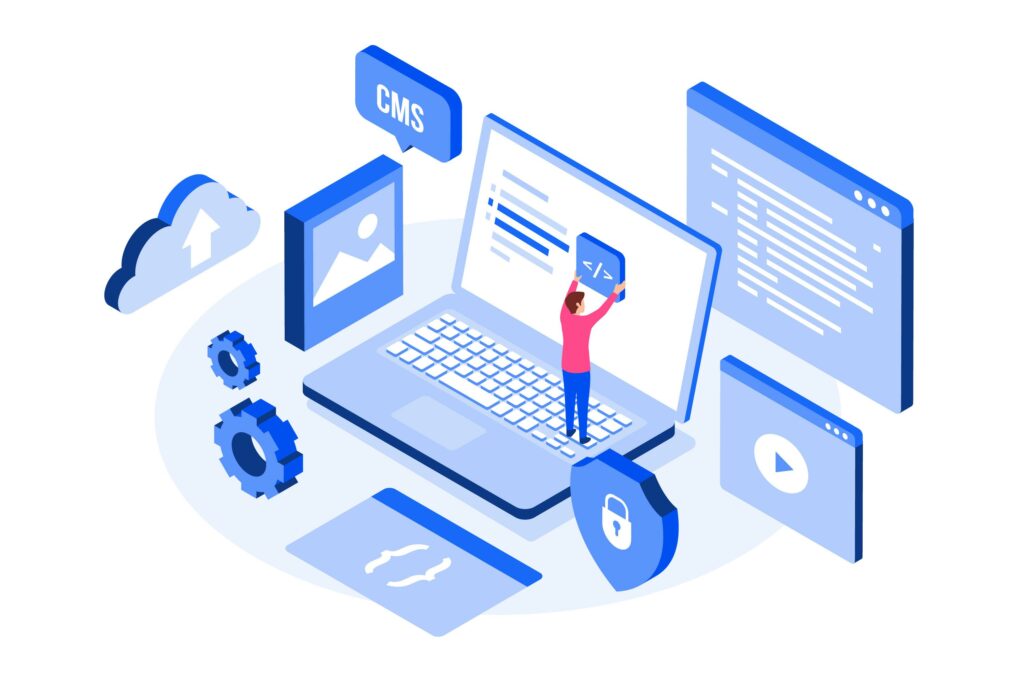Understanding the Roles & Purpose of PHP in WordPress Development

PHP for WordPress Development is a topic that should be learned. PHP plays a fundamental role in the WordPress ecosystem, serving as the backbone that empowers the creation of, feature-rich websites. Let’s explore in depth the roles and purposes that PHP serves within WordPress.
Server-Side Scripting:
At its core, WordPress relies heavily on PHP, a server-side scripting language. PHP’s primary function within WordPress is to execute custom code on the server before a webpage is delivered to a user’s browser.

This server-side processing capability is crucial as it enables WordPress to dynamically generate content, manage user interactions, and efficiently communicate with databases.
Content Management System (CMS):
PHP is integral to WordPress functioning as a versatile and robust Content Management System (CMS). Through PHP, WordPress provides a flexible framework that allows users to effortlessly create, organize, and publish content.
Developers leverage PHP to define custom post types, taxonomies, and metadata. This will allow the development of sophisticated, structured websites tailored to diverse needs.
Theme Development:
In WordPress, PHP is essential for theme development, which dictates the visual presentation and functionality of a website. Theme developers utilize PHP template files to define the layout and structure of various elements such as headers, footers, sidebars, and content areas.
This modular approach ensures consistency and facilitates seamless customization of website appearance and behavior.
Plugin Development:
PHP serves as the primary language for creating WordPress plugins, which enhance and extend the platform’s core functionalities. Plugin developers harness PHP to integrate custom features, interact with external APIs, manipulate data, and perform specialized tasks that tailor WordPress sites to specific requirements.
This extensibility through PHP empowers developers to enrich user experiences and fulfill unique business needs.
Database Interaction:
WordPress relies on PHP to interact with its underlying database system, typically MySQL. PHP provides dedicated functions and libraries that enable developers to efficiently query, retrieve, store, and update data within the WordPress database.
This seamless interaction is pivotal for dynamic content generation, ensuring responsive and data-driven website experiences.
Customization and Extensibility:
PHP’s inherent flexibility empowers developers to customize and extend WordPress functionalities according to project-specific requirements. By leveraging PHP, developers can create bespoke themes, plugins, and features that align precisely with client expectations.

The modular architecture of PHP, complemented by extensive documentation and community support, facilitates seamless integration and enhancement of the WordPress ecosystem.
PHP forms the foundational framework of WordPress, enabling developers to craft powerful, dynamic websites with unparalleled versatility. Its multifaceted roles encompass server-side scripting, content management, theme and plugin development, database interaction, and extensive customization capabilities.
This synergy underscores PHP’s indispensable contribution to WordPress as a dynamic platform for web development and content management.
Advantages of PHP in WordPress Development:
Understanding PHP is essential for maximizing the potential of WordPress, as the CMS itself is built upon PHP. This knowledge empowers developers to create highly functional and personalized websites. Moreover, leveraging PHP for WordPress development offers a host of distinct advantages:

1: Massive Community:
PHP stands as one of the oldest and most widely used scripting languages, boasting a vast community of developers. This extensive community ensures that ample resources, tutorials, and solutions are readily available for addressing any challenges encountered during WordPress development.
The collective expertise fosters collaboration and accelerates problem-solving, contributing to the robustness of WordPress as a development platform.
2: Seamless Integration & Extensibility:
Given that PHP serves as the native language of WordPress, it seamlessly integrates with the core system. This inherent integration simplifies the process of extending and customizing WordPress functionalities to align with specific project requirements.
Developers can harness PHP’s capabilities to develop plugins and themes that seamlessly integrate with existing WordPress features, thereby enhancing functionality and user experience.
3: Flexibility:
PHP provides WordPress developers with unparalleled flexibility to write custom code for theme development, plugin creation, and overall website customization. This flexibility empowers developers to tailor WordPress sites precisely to meet the unique needs and preferences of clients and end-users.

By leveraging PHP, developers can implement innovative solutions and design elements that differentiate their projects in a competitive digital landscape.
4: Better Understanding of WordPress Codex:
Proficiency in PHP grants developers a deeper understanding of the WordPress Codex, the comprehensive documentation that defines the core workings and best practices of WordPress development. Since the WordPress Codex itself is primarily written in PHP, familiarity with the language enables developers to navigate and utilize the extensive documentation effectively.
This proficiency facilitates informed decision-making and optimizes development processes, ensuring efficient implementation of WordPress features and functionalities.
5: Performance:
A solid grasp of PHP empowers the WordPress core team and developers alike to continuously optimize the platform’s codebase for enhanced performance. By leveraging PHP’s capabilities and adhering to best coding practices, developers can contribute to improving WordPress’s efficiency, responsiveness, and overall performance.
This commitment to performance optimization enhances user satisfaction and supports the scalability of WordPress websites across diverse environments and traffic conditions.
6: Scalability:
PHP enables WordPress developers to implement robust strategies for optimizing core code, managing increased traffic volumes, and integrating new functionalities seamlessly. Developers can leverage PHP’s scalability features to deploy caching mechanisms, implement database optimizations, and adopt other performance-enhancing techniques.

This proactive approach ensures that WordPress sites can effectively scale to accommodate growing demands and evolving business requirements, without compromising performance or user experience.
These advantages underscore the pivotal role of PHP in WordPress development, emphasizing its capacity to foster innovation, streamline development workflows, and deliver exceptional digital experiences. Mastery of PHP not only enhances technical proficiency but also empowers developers to leverage WordPress’s full potential as a versatile and scalable CMS platform.
Introduction to Popular PHP Frameworks for WordPress:
PHP frameworks provide a structured and efficient approach to developing web applications, including projects within the WordPress ecosystem. While WordPress is primarily recognized as a CMS, integrating PHP frameworks can significantly augment the development process by introducing robust architectural patterns and advanced features.
Here are some popular PHP frameworks commonly used alongside WordPress:
1. Laravel:
Laravel stands out as a powerful PHP framework celebrated for its elegant syntax and comprehensive feature set. Widely adopted for its developer-friendly nature, Laravel seamlessly integrates with WordPress to enhance functionalities such as custom APIs, admin panels, and complex backend systems. \
Leveraging Laravel alongside WordPress empowers developers to implement sophisticated solutions while capitalizing on WordPress’s strengths in content management.
2. Symfony:
Symfony is a robust PHP framework renowned for its adherence to the MVC (Model-View-Controller) architectural pattern and extensive set of reusable components. Ideal for building scalable and complex web applications, Symfony integrates seamlessly with WordPress to facilitate the creation of custom modules, plugins, or extensions.
By combining Symfony’s powerful tools with WordPress’s CMS capabilities, developers can achieve unparalleled flexibility and scalability in their projects.
3. CodeIgniter:
CodeIgniter stands out as a lightweight and straightforward PHP framework recognized for its simplicity and speed. It offers a minimalistic approach to web application development, making it particularly suitable for creating custom functionalities within WordPress projects.
With CodeIgniter, developers can streamline the development of bespoke features while maintaining WordPress’s core functionalities for content management and user administration.
4. Yii:
Yii emerges as a high-performance PHP framework distinguished by its emphasis on rapid development and code reusability. Equipped with robust caching mechanisms and advanced security features, Yii is well-suited for developing custom modules, APIs, or administrative interfaces alongside WordPress.
Integrating Yii with WordPress enables developers to leverage Yii’s efficiency in handling complex tasks while harnessing WordPress’s capabilities in content creation and management.
Whether opting for Laravel, Symfony, CodeIgniter, Yii, or another PHP framework, integrating these frameworks with WordPress introduces a wealth of benefits. These include enhanced routing capabilities, efficient database abstraction, powerful templating systems, and advanced security measures.
By leveraging the strengths of both PHP frameworks and WordPress, developers can achieve a synergistic blend that maximizes development efficiency and expands the functional scope of their web projects.
Integrating popular PHP frameworks with WordPress creates a compelling synergy, enriching development workflows and elevating the capabilities of WordPress-driven applications. This integration not only enhances technical capabilities but also empowers developers to deliver scalable, feature-rich solutions that cater to diverse project requirements and user expectations.
Extending WordPress with Custom PHP Code and Frameworks
WordPress, renowned for its extensive features and flexibility, occasionally necessitates extensive customizations to meet specific project requirements. In such scenarios, web development services can leverage custom PHP code or integrate existing PHP frameworks to enhance WordPress’s capabilities.

Here’s how these approaches can be effectively utilized:
Building Custom Themes:
PHP frameworks such as Laravel or Symfony provide robust tools for creating bespoke WordPress themes. These frameworks offer advanced templating engines, comprehensive routing systems, and efficient asset management capabilities.
By harnessing these features, developers can craft highly customized themes that not only align with unique design specifications but also integrate seamlessly with WordPress’s content management functionalities.
Developing Custom Plugins:
PHP frameworks excel in facilitating the development of sophisticated custom plugins for WordPress. Unlike standard plugins, which adhere to WordPress’s native architecture, frameworks like Laravel or CodeIgniter enable developers to build plugins with complex functionalities.
These plugins can interact directly with the WordPress database, incorporate external APIs, or integrate with third-party services.
This capability extends the functionality of WordPress beyond its core capabilities, enabling developers to implement specialized features tailored to specific business requirements.
Integrating APIs and External Services:
PHP frameworks are adept at seamlessly integrating with various APIs and external services. By leveraging frameworks such as Laravel or Yii, developers can effortlessly connect WordPress websites to external systems, retrieve external data sources, or automate processes that enhance the overall functionality and user experience of the WordPress application.

This integration enables WordPress sites to leverage external resources effectively while maintaining a cohesive and scalable architecture.
Enhancing WordPress with Custom PHP Code and Frameworks:
Extending WordPress with custom PHP code or integrating popular PHP frameworks empowers developers to create highly personalized and feature-rich applications that transcend the standard capabilities of the CMS.
Whether building custom themes, developing plugins with intricate functionalities, or integrating external APIs, PHP-based solutions offer unparalleled flexibility and scalability for WordPress development.
Best Practices and Considerations:
When integrating PHP frameworks with WordPress, it is crucial to observe best practices to ensure optimal performance and security. Developers should manage dependencies carefully, implement robust security measures, and adhere to standardized coding practices for enhanced maintainability.
By maintaining a disciplined approach to code organization and leveraging the strengths of PHP frameworks, developers can achieve seamless integration and deliver robust WordPress solutions that meet the highest standards of performance, security, and user experience.
Extending WordPress with custom PHP code and integrating PHP frameworks empowers developers to unlock new dimensions of functionality and customization. This approach not only expands the capabilities of WordPress-driven applications but also enables businesses to create tailored solutions that align precisely with their strategic objectives and user needs.
By harnessing the power of PHP frameworks alongside WordPress’s versatility, developers can innovate and deliver compelling digital experiences that set their projects apart in a competitive marketplace
Best Practices & Tips for PHP Development in WordPress:
When developing with PHP in WordPress, adhering to best practices is essential for maintaining code organization, optimizing performance, and ensuring security. Here are some key practices and tips to consider:
Code Organization and Maintainability in WordPress:
Modular Approach:
One of the best practices for PHP development in WordPress is to organize your code into modular components, such as classes, functions, or files based on their specific functionalities. This promotes code reusability, readability, and easier maintenance.
Use Meaningful Naming Conventions:
Choose descriptive and meaningful names for variables, functions, classes, and files. This improves code understandability and makes it easier for others (including your future self) to work with your code.
Commenting and Documentation:
Include inline comments to explain your code’s purpose, complex logic, and any potential pitfalls. Additionally, document your functions, classes, and APIs using PHPDoc or other documentation standards to facilitate collaboration and future maintenance.
Performance Optimization in WordPress:
Caching:
Implement caching mechanisms to reduce database queries and enhance page load times. Utilize WordPress caching plugins or implement server-side caching techniques such as object caching or page caching.
Minification and Compression:
Reduce file sizes and improve loading times by minifying and compressing your CSS and JavaScript files. Consider automating this process using build tools like Grunt or Gulp.
Image Optimization:
Optimize images by compressing them with minimal quality loss. Integrate image optimization libraries into your workflow or use dedicated WordPress plugins for image optimization.
Database Optimization:
Enhance performance by optimizing your database queries. This includes using appropriate indexing, minimizing unnecessary queries, and optimizing the database schema for efficiency.
Security Considerations in WordPress:

Input Sanitization and Validation:
Ensure all user inputs undergo proper sanitization and validation to prevent vulnerabilities such as SQL injection and cross-site scripting (XSS). Utilize WordPress functions like `sanitize_text_field()`, `sanitize_email()`, or `wp_kses()` for effective sanitization.
User Permissions and Roles:
Restrict access and capabilities based on user roles to ensure users only have appropriate levels of access and privileges.
Password Handling:
Store passwords securely using methods like password hashing and salting. WordPress provides built-in functions like `wp_hash_password()` and `wp_check_password()` for secure password management.
Plugin and Theme Security:
Regularly update plugins and themes to apply the latest security patches. Exercise caution when selecting and using third-party plugins and themes, opting for reputable sources whenever possible.
Regular Backups:
HPerform frequent backups of your WordPress site to safeguard against data loss and facilitate quick recovery in the event of security incidents.
[Want to learn more about PHP for WordPress Development? Click here to reach us.]
Conclusion
In conclusion, PHP stands as the cornerstone of WordPress development. It empowers developers to craft dynamic and versatile websites tailored to diverse needs. PHP allows for creating custom themes, plugins, and optimizing WordPress sites. It provides the flexibility and scalability needed for efficient customization and enhancement.
Moreover, services such as Bobcares‘ WordPress support offer invaluable assistance in maintaining and expanding WordPress projects. With expert guidance and technical support, developers can navigate challenges effectively. They can implement best practices seamlessly, and ensure continuous improvement and innovation in their WordPress endeavors.
Mastering PHP for WordPress not only unlocks the full potential of this powerful CMS but also fosters a community-driven approach to web development. As technology evolves and user expectations grow, PHP remains a steadfast ally in creating engaging digital experiences that drive success online.







0 Comments